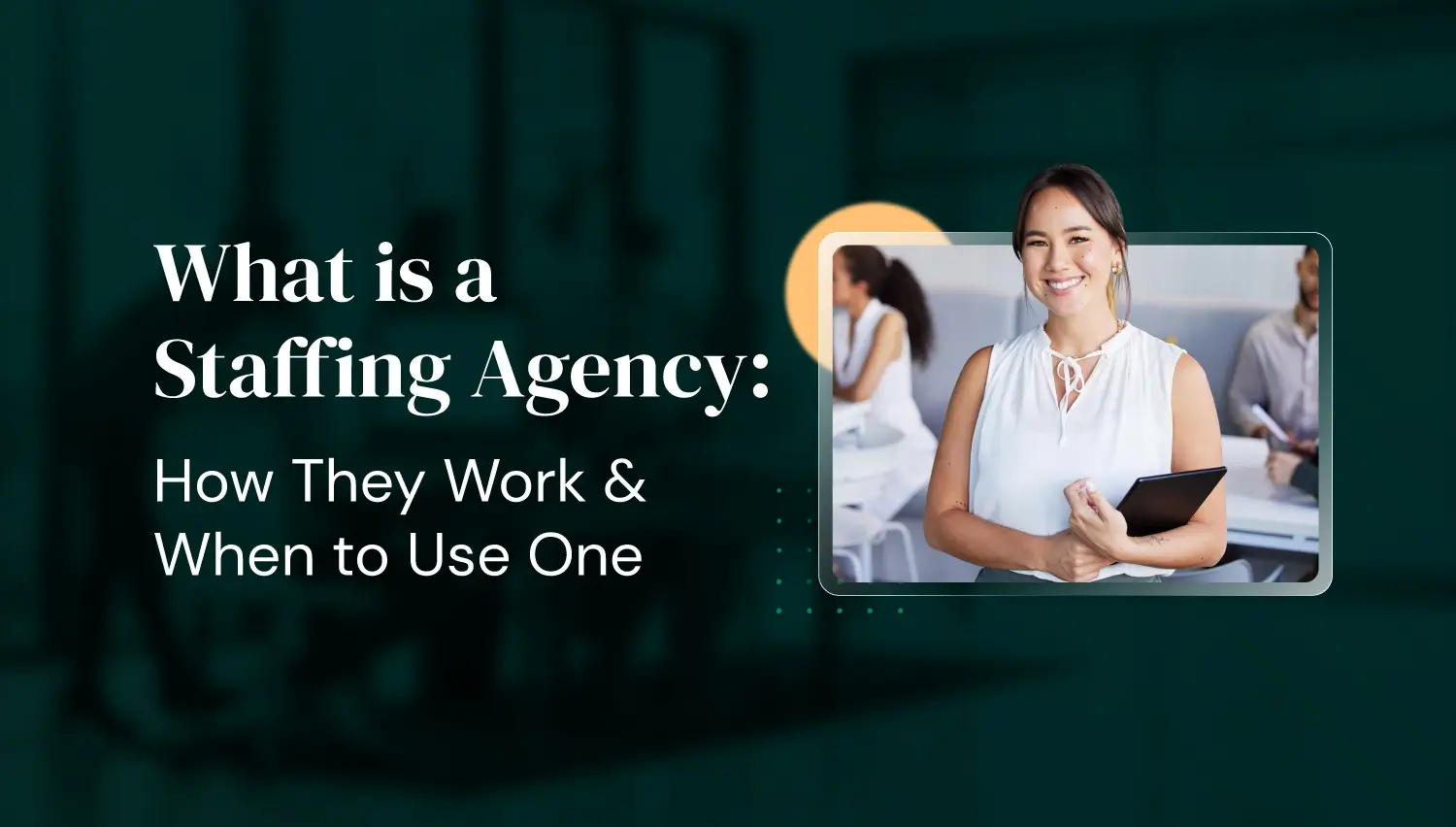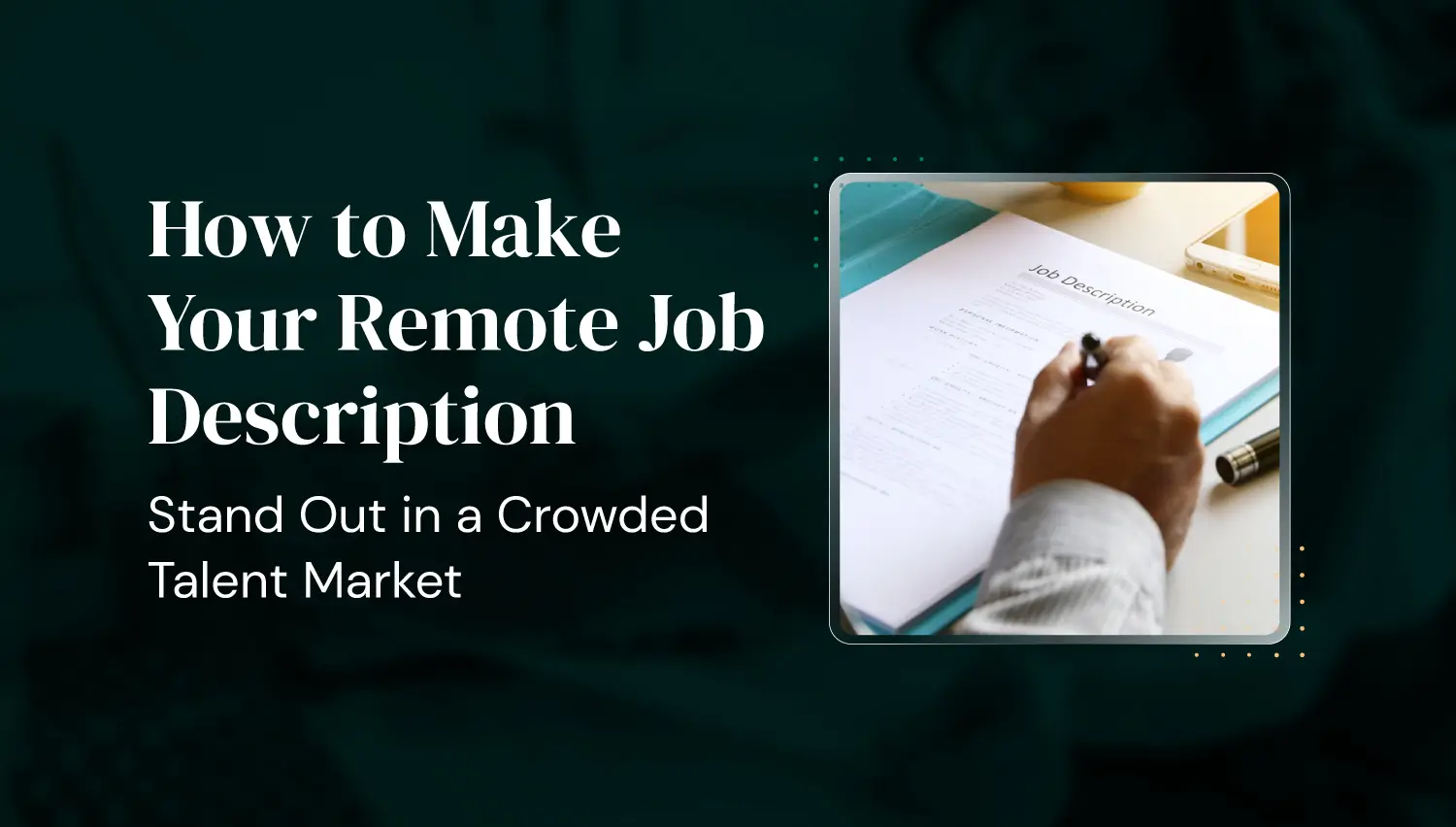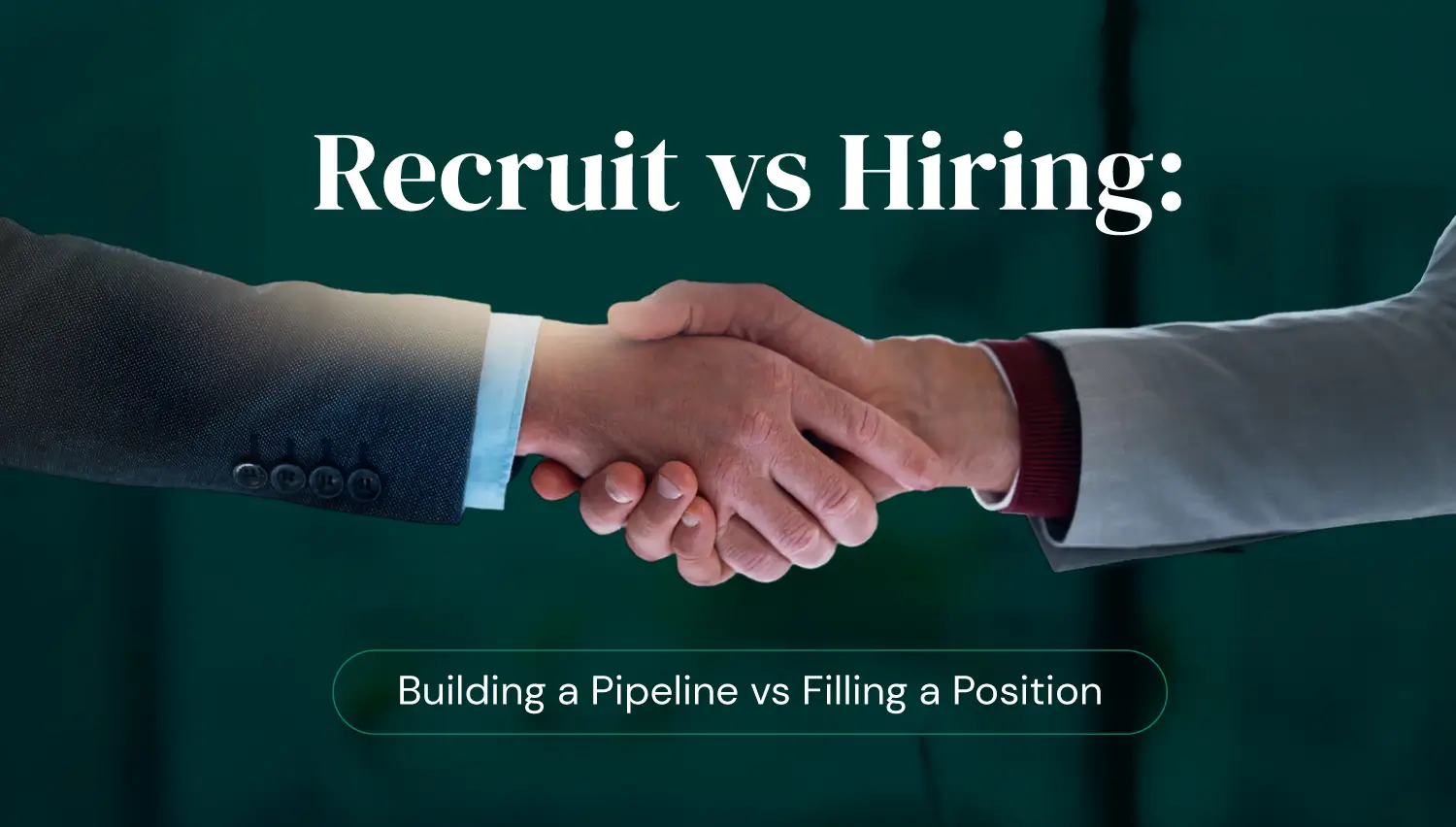A few years back, I sat across from a founder friend who'd just raised a Series A. His SaaS startup was adding customers like crazy, but hiring was turning into his full-time job. He was drowning in resumes for a single product marketing manager role; over 120 applications, half of them totally off-target. Meanwhile, his engineering team was clamoring for a DevOps hire that he had no time to pursue.
That conversation stuck with me because it's the perfect snapshot of when a staffing agency can be a lifesaver.
Staffing agencies often get stereotyped as temp-worker mills, but in reality, they're highly strategic partners for companies that want to fill roles efficiently and reduce the risk of bad hires. Whether you're scaling quickly, facing high turnover, or hunting for specialized talent, understanding what a staffing agency does and how it works can save you significant time, money, and frustration.
Let's unpack exactly what a staffing agency is, how they operate, and how to know when partnering with one makes sense for your business.
What Exactly Does a Staffing Agency Do and Why Should You Care?
When people ask me what a staffing agency is, I tell them it's essentially a talent broker, but one with skin in the game. At its core, a staffing agency connects employers who need workers with people looking for jobs. But that simple definition doesn't do justice to how deep their expertise runs, or how much risk and workload they absorb for their clients.
There are several flavors of staffing agencies, each with its own niche:
- Temporary staffing firms: Perfect for businesses that need workers for a defined period. Think covering maternity leaves, seasonal surges, or big product launches. In my experience, temp staffing can be a lifesaver for avoiding burnout on your existing team during crunch times.
- Temp-to-hire agencies: These offer a "trial run" for both the employer and the candidate. I've seen countless companies regret rushing a permanent hire only to discover a month in that there's a culture clash. Temp-to-hire helps mitigate that risk.
- Direct hire agencies: These specialize in placing permanent employees directly onto your payroll. Particularly useful for critical hires where getting it wrong can be costly, like specialized engineers or leadership roles.
- Executive search (headhunters): These firms work on highly targeted searches for senior or specialized positions. They often operate on a retained basis, meaning you pay them regardless of whether you hire, but you're paying for deep market intelligence and networks you simply won't find on job boards.
So why should you care about all this? Because every hour you or your team spend sourcing candidates, scanning resumes, and scheduling interviews is time pulled away from your core business. Staffing agencies exist to save you that time, reduce the chance of hiring mistakes, and give you access to talent pools you'd never reach on your own.
A big misconception is that staffing agencies and recruiting agencies are the same. They overlap, but there's a key difference:
- Recruiting agencies typically focus on finding permanent hires and often leave the employment relationship between you and the candidate.
- Staffing agencies, on the other hand, frequently employ workers themselves, handling their payroll, benefits, compliance, and even performance issues, which removes a significant operational burden from the client side.
I've worked with founders who thought agencies were only for low-wage or entry-level roles. In reality, some of the smartest startups I know have relied on staffing partners to secure specialized talent quickly, especially in high-demand markets where speed and discretion are crucial.
So when you hear "staffing agency," think beyond temp work. Think strategic partner. Think flexible workforce solution. And think about how much bandwidth (and peace of mind) you could gain by letting experts handle the hiring heavy lifting.

How Staffing Agencies Operate
Every good agency starts by drilling into the "why" behind your hiring needs. They're not just skimming your job description. They're dissecting your business DNA.
They'll probe questions like:
- What problems will this hire solve? Is it filling a skills gap, handling a product launch, or preparing for rapid scaling?
- What personality traits work best on your team? Are you highly collaborative, fast-paced, hierarchical, remote-first?
- Where's your business headed? They want to know your funding stage, growth goals, and where new roles fit in the bigger picture.
I've seen this process save companies from major hiring mistakes. One founder I know was certain he needed a "sales manager." After a few conversations with the agency, it became obvious he actually needed a sales operations leader who could build systems and manage data for a growing team, not someone to chase new deals. That clarity changed the entire search.
Where technology fits in:
Some agencies now feed your job specs into machine-learning models that compare your needs with prior successful placements. This can flag skill combinations or personality traits statistically tied to success in similar roles. Insights a human alone might miss.
Tapping Broad and Hidden Talent Pools
This is the real magic of staffing agencies. Unlike in-house HR teams limited to job boards or LinkedIn posts, agencies cast a much wider net, including channels you might never think to explore.
Here's how they source talent:
- Private databases: Many agencies maintain proprietary databases of pre-vetted candidates, tagged with skills, career interests, and work eligibility across different regions.
- Industry networks: They show up at niche industry events, online forums, and private Slack or Discord communities where specialized talent hangs out.
- Referrals: Top agencies get referrals from candidates they've placed successfully. People trust them enough to share friends or former colleagues who might be quietly open to new roles.
- Active outreach: The best recruiters don't wait for applications. They proactively message passive candidates who aren't looking but might be convinced for the right role.
- Digital footprinting: Advanced agencies use AI tools that scrape data from social profiles, portfolios, and even GitHub activity to identify potential talent signals, like someone subtly indicating they're ready for a new challenge.
Rigorous Screening and Assessment
Agencies protect your time (and your brand) by filtering candidates before they ever hit your inbox. This is where the real labor happens:
- Pre-screen interviews: Recruiters dig into motivations, gaps in the resume, compensation expectations, and whether someone's truly interested, not just casually browsing.
- Technical assessments: For tech, creative, or specialized roles, many agencies administer coding tests, portfolio reviews, or simulations of real work tasks.
- Soft skill evaluation: Some of the best agencies use behavioral interviews or situational judgment tests to assess how candidates handle conflict, teamwork, or ambiguity.
- Background checks: Agencies often run criminal record checks, employment verifications, and reference calls so you don't have to.
- Cultural fit analysis: Great agencies look beyond technical skills. I've seen recruiters eliminate candidates with perfect resumes because their communication style or work pace clashed with the client's culture.
Where technology fits in:
Modern agencies increasingly deploy AI tools for initial screening, scoring candidates against your job specs, and identifying hidden gems with transferable skills. Even if their resumes don't perfectly match keywords. Predictive analytics can also estimate how likely a candidate is to stay in a role for 12+ months based on historical patterns.
This step alone can save founders weeks of time and protect them from costly hiring mistakes.
Managing Interviews and Communication
Once qualified candidates are identified, staffing agencies handle the complex logistics that stall many hiring processes. This includes:
- Scheduling: Agencies coordinate calendars between busy hiring managers and candidates, smoothing time zones and last-minute changes.
- Candidate prep: They brief candidates on interviewers, likely questions, and cultural expectations, which improves the quality of conversations.
- Feedback loop: They gather feedback from both sides, spotting misalignments early.
- Negotiations: Agencies act as a neutral party in salary or title discussions, preventing conversations from getting awkward or adversarial.
I've watched agencies rescue searches that were on the brink of collapsing because the candidate and client misunderstood each other's expectations. An experienced recruiter can often mediate, clarify intentions, and save the match.
Where technology fits in:
Some agencies use automated interview scheduling tools, video interview platforms with AI scoring, and feedback portals to streamline communication and reduce delays.
Handling Offers, Onboarding, and Employment Logistics
Here's the biggest difference between a staffing agency and a pure recruiting firm: many staffing agencies don't just find talent; they legally employ them on your behalf.
- Employer of Record (EOR): For temp, contract, or international roles, the staffing agency becomes the worker's legal employer. They handle:
- Payroll and tax withholding
- Benefits administration (health, PTO, retirement)
- Compliance with local labor laws, which can be crucial if you're hiring across state or country lines
- Onboarding: Even in direct hire, agencies help candidates complete paperwork, sign agreements, and get set up with your systems. A good partner can help reduce first-day chaos.
- Risk mitigation: If a temporary hire doesn't work out, the agency can replace them quickly, often at no extra cost under guarantee periods.
I once helped a company expand into three new states simultaneously. Without an agency acting as EOR, they'd have needed to register as an employer in each jurisdiction, figure out state-specific labor laws, and set up multi-state payroll. All massive headaches they simply avoided by using the agency's infrastructure.
Where technology fits in:
Many agencies now use digital onboarding platforms where candidates e-sign documents, complete tax forms, and even choose benefits online. Some systems track compliance by jurisdiction, instantly flagging missing paperwork or legal risks.

What Are the Real Benefits of Partnering with a Staffing Agency?
Faster Hiring Cycles
If you've ever tried hiring for a critical role while running a business, you know how fast weeks evaporate into phone screens, resume reviews, and no-show interviews.
Staffing agencies dramatically cut time-to-hire because:
- They've already built networks of candidates in specific industries or job functions.
- They can prioritize urgent searches and deploy multiple recruiters at once.
- They use technology to quickly match candidates to roles instead of starting every search from scratch.
Access to Specialized Talent
Even the best in-house recruiters have limits to their networks. Staffing agencies specialize in markets and talent pools you may not even know exist.
- Niche skill sets: From SAP functional consultants to regulatory affairs managers in biotech, agencies often know precisely where to find rare expertise.
- Passive talent: The strongest candidates are usually employed and not browsing job boards. Agencies have relationships that help reach these individuals quietly.
- Geographic reach: If you're hiring across multiple states or countries, agencies know local talent markets and labor laws, something that's critical if you're expanding globally.
Reduced Hiring Risk
The most expensive mistake in hiring is choosing the wrong person. Replacing a mid-level employee can easily cost 20-30% of their annual salary in recruiting, lost productivity, and team disruption.
Agencies help mitigate that risk by:
- Screening out poor fits: They pre-vet candidates for both technical skills and cultural alignment.
- Offering trial periods: Temp-to-hire contracts let you evaluate performance before committing to permanent employment.
- Providing replacement guarantees: Many agencies will replace a hire at no extra cost if someone leaves during a guarantee window (often 60-90 days).
Operational Relief and Compliance Risk Management
One underestimated benefit is how much operational burden agencies remove from your team. This matters more than ever as businesses hire across multiple states, countries, and regulatory regimes.
Agencies handle:
- Payroll and tax withholdings
- Benefits administration for contract workers
- Compliance with local labor laws (especially critical for remote or global teams)
- Insurance and liability coverage for contingent workers
I worked with a client who wanted to hire contractors in three different states. Each state had unique employment laws, from sick leave requirements to worker classification rules. As a staffing agency, we acted as the Employer of Record, removing legal risk and complexity almost overnight.
Cost Predictability
There's a myth that using agencies always costs more. The reality is that bad hires, legal fines, and turnover are far more expensive.
Agencies provide:
- Fixed markup rates or clearly defined fees, so you can budget accurately.
- Flexibility to scale your workforce up or down without severance costs.
- Avoidance of costs tied to advertising, screening, and onboarding that you'd otherwise bear in-house.
Especially in uncertain markets, financial predictability can be a competitive advantage.
When to Consider Using a Staffing Agency
I've always believed staffing agencies are like specialized tools in a founder's toolkit; you don't need them for every job, but when you do, nothing else works as well.
Here are the situations where partnering with an agency makes real sense:
- Urgent hires: You need to fill a role yesterday; for example, a developer for a product launch or a finance lead before year-end close. Agencies can fast-track talent because they're not starting from scratch.
- Hard-to-fill roles: You're hiring for niche skills, unusual combinations of experience, or in a tight talent market. Agencies often know exactly where to find these unicorns.
- Seasonal or project-based work: Your business has peaks. Think holiday retail surges, tax season for accounting firms, or a big software migration. A staffing agency lets you scale up and down without long-term commitments.
- Limited internal bandwidth: Your HR team is swamped, or you're a small startup without in-house recruiters. Agencies can step in as an outsourced talent function.
- Geographic expansion: You're hiring in new states or countries with unfamiliar labor laws. Agencies can act as Employer of Record, shielding you from compliance headaches.
- Desire to lower risk: You want a trial period before committing to a permanent hire, or you're wary of misclassifying contractors. Agencies structure these engagements safely.
The Right Staffing Partner Can Be a Game-Changer
Staffing agencies aren't for every single hire, but for the right roles, they can transform how fast and effectively you build your team. If you're facing hiring roadblocks, expanding into new markets, or simply want to offload the heavy lifting of recruitment, it's worth exploring how a trusted partner can help.
Somewhere specializes in helping businesses build world-class teams across borders and industries, with deep expertise in navigating compliance, complex talent markets, and specialized roles.
If you're curious how working with a staffing partner could save you time, lower risk, or unlock hard-to-find talent, reach out using the contact form below. Let's talk about how to keep your hiring process as agile as the rest of your business.










.jpeg)



